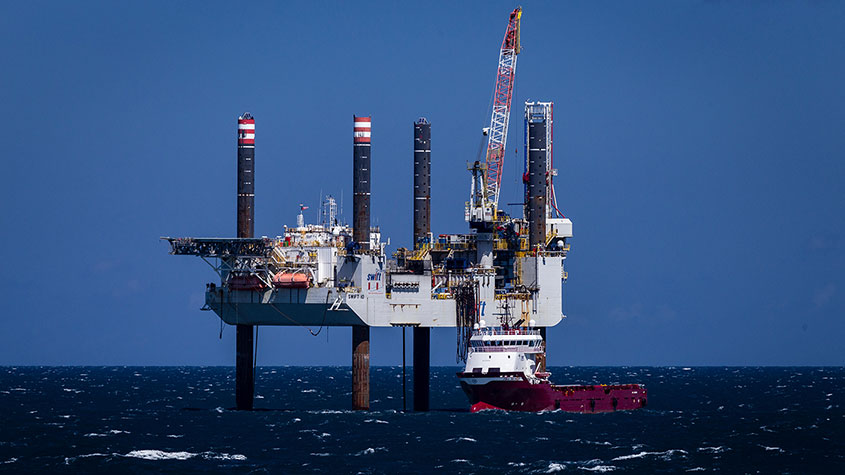Three stocks to protect your portfolio from the energy shock
Professional investor Chris Clothier of the Capital Gearing Trust picks three stocks to buy for inflationary times.

Get the latest financial news, insights and expert analysis from our award-winning MoneyWeek team, to help you understand what really matters when it comes to your finances.
You are now subscribed
Your newsletter sign-up was successful
Want to add more newsletters?

Twice daily
MoneyWeek
Get the latest financial news, insights and expert analysis from our award-winning MoneyWeek team, to help you understand what really matters when it comes to your finances.

Four times a week
Look After My Bills
Sign up to our free money-saving newsletter, filled with the latest news and expert advice to help you find the best tips and deals for managing your bills. Start saving today!
The Organisation of Arab Petroleum Exporting Countries – a regional cousin of oil cartel Opec – discovered its tremendous pricing power in oil markets after the Yom Kippur War in 1973. That realisation, among other factors, helped usher in the stagflation of the 1970s and a lost decade for investors. In the latter half of 2021, we became concerned that Vladimir Putin had reached the same conclusion regarding natural gas in Europe. Prior to the invasion of Ukraine, Russia supplied 40% of Europe’s gas, and a higher gas price would mean higher European electricity prices and higher inflation.
A dearth of oil and natural gas exploration in recent years has exacerbated the issue. Similarly, the transition to a low carbon economy will be inflationary as productive energy capacity is taken offline and replaced with new renewable energy sources. The tragic events unfolding in Ukraine have reinforced these trends. These considerations helped inform our portfolio positioning as we came into 2022.
Let there be light
We hold a basket of renewable energy infrastructure funds, including NextEnergy Solar Fund (LSE: NESF), which look set to benefit from the current macroeconomic backdrop in two ways. First, around half of NESF’s revenues are derived from the sale of electricity. Electricity prices have increased fourfold over the past 12 months, and many renewable energy funds are beginning to lock in these prices via longer-term agreements. Its other source of revenue is government subsidies which, in the UK, are linked to the retail price index. The fund stands to profit from high inflation and any increase in long-term inflation forecasts will flow through to its net asset value (NAV).
MoneyWeek
Subscribe to MoneyWeek today and get your first six magazine issues absolutely FREE

Sign up to Money Morning
Don't miss the latest investment and personal finances news, market analysis, plus money-saving tips with our free twice-daily newsletter
Don't miss the latest investment and personal finances news, market analysis, plus money-saving tips with our free twice-daily newsletter
A tried and tested inflationary hedge
SPDR MSCI Europe Energy ETF (LSE: ENGY) is an exchange-traded fund (ETF) comprising the major European oil producers, including Shell, BP and Total. The European oil sector trades at seven times earnings, assuming a longer-term oil price of $80 per barrel. This level seems sustainable given rising annual demand and low levels of exploration. During the stagflationary period of the 1970s, the top performing stockmarket sectors were energy and materials. Technology and consumer staples – the stockmarket darlings of the recent past – lagged badly. This ETF could provide a hedge to such an environment.
Falling back on the basics
Taylor Maritime Investments (LSE: TMI) holds a portfolio of 30 modern dry-bulk carriers, which typically carry agricultural and industrial commodities. The market is under-supplied with these vessels and, unlike container ships, that shortage looks set to persist since few new deliveries are scheduled in coming years. This shortage translates to high charter rates: TMI’s portfolio is delivering average cash yields of 25% per annum, before depreciation. It has low leverage and trades at around a 10% discount to NAV.
Historically speaking, shipping has done well during periods of war, as war disrupts trade patterns, increasing shipping miles and therefore fleet utilisation. Dry-bulk carriers are also relatively insensitive to economic fluctuations since they transport staples such as grain, soybeans and iron ore. The fund targets a dividend of over 5% but has signalled that, due to elevated levels of cash generation, it may pay special dividends in the coming months.
Get the latest financial news, insights and expert analysis from our award-winning MoneyWeek team, to help you understand what really matters when it comes to your finances.
Chris Clothier is co-manager of the Capital Gearing Trust.
-
 Should you buy an active ETF?
Should you buy an active ETF?ETFs are often mischaracterised as passive products, but they can be a convenient way to add active management to your portfolio
-
 Power up your pension before 5 April – easy ways to save before the tax year end
Power up your pension before 5 April – easy ways to save before the tax year endWith the end of the tax year looming, pension savers currently have a window to review and maximise what’s going into their retirement funds – we look at how
-
 Is the market missing the opportunity in energy?
Is the market missing the opportunity in energy? -
 6 stocks to buy to invest in Latin America
6 stocks to buy to invest in Latin AmericaThe region is the world’s one-stop shop, boasting the raw materials required for the energy transition and key foodstuffs to cater for growing populations, says James McKeigue. Here’s how to profit.
-
 The demand for oil is slowing and green energy is taking over
The demand for oil is slowing and green energy is taking overThe IEA forecasts oil demand growth to slow sharply in the next few years. The end of the era may be underway.
-
 Is now the time to invest in oil as oil stocks top the S&P 500?
Is now the time to invest in oil as oil stocks top the S&P 500?Tips Oil stocks have enjoyed massive gains in the S&P 500. We take a look at the index’s best and worst performers and if now is a good time to invest in crude oil.
-
 Fuel prices could rise again as Opec cuts production
Fuel prices could rise again as Opec cuts productionNews Major oil-producing countries have decided to cut oil production by two million barrels per day – could this mean higher fuel prices?
-
 Why is the petrol price rising again?
Why is the petrol price rising again?Brits are being hit by a triple-whammy of increasing oil prices, a falling pound, and new fuel mix standards that are pushing up petrol prices
-
 John Wood Group: needs polish, but has plenty of potential
John Wood Group: needs polish, but has plenty of potentialTips Oilfield engineer John Wood’s share price has underperformed, its prospects are solid and it looks too cheap
-
 Five London-listed stocks to play the coming oil shortage
Five London-listed stocks to play the coming oil shortageTips After peaking in June, the oil price has fallen back and oil companies have fallen out of favour with investors. But with supply predicted to outstrip demand, there are plenty of opportunities to profit. Here, Rupert Hargreaves picks five of the best London-listed oil stocks to buy now.
